A) Panel Discussion on Decentralizing Climate Action: Unlocking Local Governments’ Role in Climate Finance.
The Centre for Business and Economic Research (CBER), Institute of Business Administration held a policy dialogue titled “Decentralizing Climate Action: Unlocking Local Governments’ Role in Climate Finance” on January 31, 2026. The event featured three focused panel sessions on Local Data & Decision-Making, Governance & Policy Gaps, and Financing & Implementation Pathways. The discussions highlighted practical challenges and opportunities for strengthening local governments’ role in climate finance, with key takeaways receiving coverage in both local and international media, see links below. Speakers included Advisor to the Finance Minister Khurram Shahzad, Ali Tauqeer Sheikh, Dr. Khalid Waleed, Zubair Channa, Naveed BHUTTO, Imtiaz Bhatti, Kashif Ali Shaikh, Sahar Arshad Mahmood, Lubna Naz, Yasir Husain and Aadil Nakhoda. The session was attended by a diverse group of participants from civil society, local and federal governments, academia, and research students from IBA and other universities.

B) Prof. Todd Feldman, Professor of Finance at San Francisco State University and (Director of the Lam-Larsen FinTech Initiative)- Lecture on “Financial Infrastructure, Payments, and Stablecoins”.
CBER at Institute of Business Administration hosted Prof. Todd Feldman, Professor of Finance at San Francisco State University and Director of the Lam-Larsen FinTech Initiative for a thought-provoking lecture on “Financial Infrastructure, Payments, and Stablecoins” on January 19, 2026. The session was attended by our esteemed faculty from School of Economics and Social Science (SESS), IBA, Karachi, School of Business Studies, IBA Karachi School of Mathematics and Computer Science, IBA Karachi, fostering an engaging discussion on the evolving architecture of digital payments, the role of stablecoins in modern financial systems, and emerging policy and regulatory considerations.

C) PAIDAR Programme (Poverty Alleviation and Inclusive Development Across Rural Sindh), funded by the European Union and implemented by UNIDO.
Carolin Nast International Project Administrator PAIDAR Program and Sabir Hussain visited Centre for Business and Economic Research, Institute of Business Administration on 29th January, and held a discussion on exploring opportunities for research collaboration on program evaluation focusing on UNIDO’s PAIDAR Programme (Poverty Alleviation and Inclusive Development Across Rural Sindh).

Centre for Business and Economic Research, UNICEF and Dow University of Health Sciences jointly organized a seminar to commemorate World Breastfeeding Week 2025
Aug 27, 2025: Centre for Business and Economic Research, UNICEF and Dow University of Health Sciences jointly organized a seminar to commemorate World Breastfeeding Week 2025. The event brought together academia, policymakers, healthcare professionals, and civil society representatives to emphasize the urgent need to strengthen breastfeeding practices in Pakistan. The seminar opened with welcoming remarks by Dr. Lubna Naz (IBA), followed by an inaugural address from Ms. Nida Khuro, Member of Parliament, Government of Sindh. Ms. Khuro underscored the importance of breastfeeding for maternal and child health while highlighting the Government of Sindh’s initiatives to implement and promote breastfeeding laws. She also engaged directly with participants, addressing various questions raised during the interactive session. Speakers throughout the event reiterated that breastfeeding is a cornerstone of child survival, maternal well-being, and economic sustainability.
News Paper Coverage: Click here

Indus Waters Treaty in Perspective: A call for water diplomacy, renegotiating treaty, and internal cohesion
May 29, 2025: Center for Business and Economic Research (CBER) organized a Policy Roundtable “Indus Water Treaty in Perspective”, to discuss the implications of the India’s unilateral suspension of the Indus Water Treaty (IWT) in April 2025. The session brought together government officials, journalists, and academicians to engage in dialogue on the topic.
Experts highlighted a critical lack of institutional capacity to engage and respond meaningfully with the treaty’s technical and legal dimensions on diplomatic fronts. While water-related subjects are taught at universities, there remains an urgent need to develop specialized expertise in international water law and transboundary water diplomacy. Participants criticized misleading media narratives about India “blocking water,” noting that such claims are technically unfeasible without massive infrastructure and serve more as political rhetoric than reality. With India’s recent stance opening space for renegotiation, participants urged Pakistan to pursue Treaty reforms aligned with modern legal frameworks such as the UN Watercourses Convention and Helsinki Rules. Participants called for a multi-stakeholder working group to provide actionable recommendations to government on IWT. Emphasis was placed on climate preparedness, institutional reform, and inter-provincial trust as essential foundations for defending Pakistan’s water rights and future.

Pakistan Economic Outlook for upcoming budget 2025-26
May 13, 2025: The Centre for Business and Economics Research (CBER) at Institute of Business Administration (IBA) Karachi, organized a pre-budget panel discussion to critically examine the state of Pakistan’s economy and assess the key challenges and priorities ahead of the Federal Budget 2025–2026.
The seminar brought together leading voices from government, policy, media, and the development sector to deliberate on Pakistan’s fiscal outlook considering evolving global trade dynamics, recent tariff actions, and IMF commitments. The session was moderated by Dr. S. Akbar Zaidi, Executive Director, IBA Karachi, and featured a distinguished panel comprising Dr. Miftah Ismail (Former Minister of Finance), Dr. Zehra Farooq (Secretary, Income Tax Policy, Federal Board of Revenue), Khurram Husain (Business and Economy Journalist), and Nadia J. Seth (General Manager, SMEDA, Ministry of Industries and Production).
The discussion covered a wide range of pressing issues expected to shape the upcoming budget. Panelists assessed the fiscal space available to the government and highlighted the anticipated challenges in meeting revenue targets, especially under ongoing IMF reform conditions. Attention was also drawn to Pakistan’s comparatively high tax rates and the need to prioritize pro-poor spending through targeted social protection programs.
Tax policy and compliance emerged as a central challenge, with insights shared on the importance of expanding the tax base and simplifying the tax filing process to encourage greater public participation as well as documentation of the economy. The discussion also addressed the increasing weight of defense expenditure in the federal budget, particularly in the context of recent geopolitical tensions in the region, and how it could affect development and social sector spending.
The event was followed by Q/A session and attended by faculty members, students, researchers, and professionals from the public and private sectors

IBA-CBER hosted a workshop on Agenda setting for Cities and Climate Change

IBA-CBER, in collaboration with CDPR, IGC, the World Bank, and the Urban Unit, Government of Punjab, hosted a workshop on Agenda setting for Cities and Climate Change on February 25, bringing together policymakers, researchers, and practitioners to discuss climate-resilient urban development.
The discussions focused on spatial vulnerabilities in cities, data-driven planning, governance, and innovative financing solutions for climate risk mitigation. Participants highlighted the strong connection between socioeconomic and spatial vulnerabilities, emphasizing how marginalized communities are disproportionately affected due to inadequate infrastructure and limited adaptive capacity. Key takeaways included the need for local-level data collection, capacity building for evidence-based planning, and improved interdepartmental coordination to drive informed decision-making.

The Director IBA-CBER participated in the PNDS event “Food for Health or Disease” at the 21st Health Asia International Exhibition & Conferences

The CBER Director participated in the PNDS event “Food for Health or Disease” at the 21st Health Asia International Exhibition & Conferences, Expo Center Karachi on October 19, 2024. She spoke on several key issues. She said trans fats come in two types—industrially produced (iTFAs), such as hydrogenated oils, and naturally produced ones, such as those in pure ghee. Over time, data shows a shift toward iTFAs, driven by affordability. This trend highlights the need to investigate market factors that influence consumer choices. She stated that household data (PSLM/HIES) in Pakistan on iTFA in food consumption excludes what is consumed in restaurants, festivals, and social gatherings, leading to an incomplete understanding of iTFAs intake. To enhance the robustness of this data, we need innovative tools that capture all sources of iTFAs consumption. Urban consumers, in particular, have easy access to food high in industrial trans fats (i.e., fried foods, cakes, biscuits), often ordering it online through platforms like Food Panda. This raises concerns about the quality of food consumed. In addition to accessibility and affordability, there is a lack of awareness around reading food labels carefully before consumption.
The CBER Director emphasized that knowledge sharing on the importance of reading food labels is essential, and advocacy groups can play a crucial role in this regard. The consumption of iTFAs ( > 2 grams of iTFA per 100 grams of total fat in all foods as per World Health Organisation) is associated with a greater likelihood of obesity, ischemic heart disease, and stroke. Food labels in Pakistan are often not prepared with the help of nutritionists and are not adequately monitored by the Pakistan Standards and Quality Control Authority (except for a few, the S-221 standard for Vanaspati ghee, which recommends limiting iTFAs consumption to< 5%). This reflects a principal-agent problem, where the consumer (principal) delegates authority to producers (agent) and the government (agent/regulator) to ensure that healthy food products reach the market. However, consumers only have access to the end product, with little insight into the production process.
She further stated that many countries have addressed this issue by involving third parties such as non-governmental bodies, professional organisations, experts, and the private sector to ensure the accuracy of iTFA content in food labels. Edible oils like palm and soybean oil are among Pakistan's top three imports, contributing billions to the import bill and affecting the country’s trade landscape. The growing consumption of iTFA-intensive products only exacerbates this. She emphasised on the need for continuous improvement in the food ecosystem through engagement, collaboration, and coordination among stakeholders.
SESS and CBER Launches Report on 'The State of Pakistan's Economy 2024-25'
The School of Economics and Social Sciences (SESS) in collaboration with Center for Business and Economic Research (CBER) at the Institute of Business Administration (IBA) launched its report The State of Pakistan's Economy 2024-25 on 3rd October 2024 at the IBA, Karachi. This year's theme is Tapping the Economic Potential: Strategies for Productivity and Growth. The report is authored by the faculty members and students from the Department of Economics, SESS. It is edited by Dr. Heman Das Lohano and Dr. Lubna Naz.
This report presents analyses and proposes strategies for selected sectors of the economy to unlock Pakistan's potential, paving the way for a future characterized by prosperity and sustainable economic growth. It offers some fresh thought on old problems and is essential reading for students, policymakers and for those interested in understanding not what the problems are, but ways we can rethink ways of improving the economy. It highlights the immense potential of Pakistan's economy, driven by its abundant resources, strategic location, and young, dynamic population. However, the report also underscores the significant challenges hindering the country's progress, including inflation, low economic growth, and energy shortages.
Renowned economists and practitioners Dr. Farooq Pasha, Shereen Narejo, and Dr. Mahmood Khalid discussed the key findings and recommendations of the report during the launch event, providing valuable insights into Pakistan's economic landscape. The session was moderated by Dr. Heman Das Lohano, who started the discussion by emphasizing that to unlock its full economic potential, Pakistan needs to adopt a comprehensive approach that addresses both short-term challenges and long-term structural issues.
Dr. Khalid stated that the tax policies designed by FBR should be consistent, and have rationale. Currently the system is too complicated especially for the wholesalers and retailers who can easily be brought in the tax net. He also opined that the cost of compliance is very high.
Ms. Narejo emphasized that creation of jobs in the economy is more important than ever before. Millions have become jobless especially after the covid. She added that estimates show that the home based economy is around $453 billion. This should be tapped. Similarly, the waste management has a huge potential. Just using banana waste, five different products can be made.
Following the discussion, the attendees engaged in a Q&A session with the panelists. The event concluded with Dr. Syed Jaffar Ahmed, Dr Asma Hyder and Dr. Muhammad Nasir presenting mementos to the panelists.

Experts call for better food governance to combat non-communicable diseases
Dr. Lubna Naz, Director CBER participated in the dialogue on Non-Communicable-Diseases and Food Governance in Pakistan at the Black Hole. I shared two key points to critically assess our food governance system and use of fiscal policy instruments to address risk factors (such as unhealthy diets) of non-communicable diseases in Pakistan.
First, instead of focusing solely on human health, we should adopt a "One Health approach", which recognises that the health of people is closely linked with animal health and the overall ecosystem. Our health is intricately linked to what we grow and eat and the environment we live in. We need to rebuild our environment for degradation by investing in environmental assets and human capacities.
Second, we have made attempts to curb the consumption of unhealthy diets, including Sugary and Sweetened Beverages (SSBs), through fiscal measures. For example, the government of Pakistan imposed the Federal Excise Duty (FED) on SSBs of 20% along with 18% General Sales Tax (GST) in 2023-24. However, a careful analysis of the implications of such tax imposition shows that while sales revenue dropped by 40% as the industry cut down sales in response to decreased demand. But it led consumers to turn to substandard and cheap SSB products offered by the undocumented sector, undermining the intended health benefits of the measures. Therefore, it is necessary to reassess the primary objectives of tax imposition and the strategic responses by producers and retailers.
Furthermore, increasing taxes on hyper palatable foods (those which are dense in energy and lower in nutrients) while reducing them on healthy foods could encourage people to switch to healthier food consumption. A fiscal policy task force on health is the need of the hour.
In addition to fiscal measures, we need to include healthy diets in our school curriculum to nudge younger population towards healthier food choices.

Meeting with German First Secretary
German First Secretary Janine Rohwer visited CBER, IBA to discuss the Climate Change issues on May7th, 2024. The meeting was led by the Director CBER, Dr. Lubna Naz other members included Dr. Adam Abdullah and Dr. Sajjad Ahmed. Director provided an overview of the projects undertaken by the faculty on topics related to Climate Change. Dr. Sajjad also highlighted the resource management challenges. While Dr. Adam Abdullah highlighted the policy gap on Climate Change at government level. He further mentioned the importance of research and acquisition of data for policy drafting by the government. The discussion centered around IMF conditionalities and their implications on Pakistan’s economy, climate governance and financing, disconnect between governance and evidence, energy product pricing and renewable energy opportunities, and few other. The German First Secretary Janine Rohwer showed keen interest in collaborating with CBER, IBA in research and advocacy.

CBER and ASER conducted research workshop for students and early career faculty on using ASER data in Research
May 6th, 2024: Our team member, Ms. Fatima Hafeez, a Researcher at ASER Pakistan, recently facilitated a comprehensive training workshop at Centre for Business and Economic Research, IBA-SESS. The focus of the workshop was to enlighten participants on effectively utilizing ASER data in their research projects. Ms. Hafeez also shared the latest findings from the ASER 2023 Survey and provided invaluable insights into the intricacies of the data collection process. Through hands-on practice sessions, students were skillfully guided through the practical application of these methodologies.

IMF Program and Pakistan’s Economy
April 29th, 2024: The Center for Business and Economic Research (CBER), Institute of Business Administration (IBA) Karachi, hosted a seminar on IMF Program and Pakistan’s Economy: Insights, Challenges and way forward. The event was graced by Dr. Aisha Ghaus Pasha, Eng. Memon Abdul Jabbar, and Dr. Asad Sayed. The session was moderated by Dr. Faiz ur Rehman. Dr. Aisha Ghaus discussed the problems of approaching IMF and stated that the conditionalities of IMF packages always impact the general masses harshly. She also talked about the austerity measures, ongoing taxation reforms, and debt burdens. She added that taking on additional debt from the IMF can exacerbate Pakistan's already significant debt burden, leading to concerns about debt sustainability and the country's ability to repay its loans in the future. Eng. Jabbar further highlighted about the mistakes of the past have been carried forward without realizing that sustainability can only be brought to Pakistan’s economy through massive reforms. Furthermore, Dr. Asad Sayed while discussing the importance of structural reforms emphasized that these reforms are a much-needed step whether with IMF or without IMF. He stated that the country is facing several major concerns such as food insecurity, 23 million out of school children and stagnated GDP growth rate. The seminar concluded with an interactive question-and-answer session. Dr. Lubna Naz, Director CBER closed the seminar with vote of thanks to all attendees.

Asian Development Bank delegation visits IBA Karachi
March 26, 2024: The Asian Development Bank (ADB) delegation visited Center for Business and Economic Research (CBER), IBA Karachi to discuss Pakistan’s current macroeconomic outlook and potential avenues for future collaborations.
The discussion focused on multiple topics, including Pakistan’s dependence on fuel imports, inefficient subsidies in agriculture and energy, political instability versus stability, digital economy and non-conventional businesses, low productivity and low growth trap, human capital crises, devolution of resources to local government level and its implications for growth, supply chain issue in food industry, and IMF’s conditions for Pakistan and its implications.
The IBA team led by Dr. Lubna Naz, Director, CBER included Dr. Muhammad Nasir, Associate Professor and Chairperson, Economics Department; Dr. Heman Das Lohano, Professor and Program Director BS (Economics and Eco. & Math); Dr. Aadil Nakhoda, Assistant Professor; Dr. Faiz Ur Rehman, Associate Professor and Program Director (MS and PhD Economics); and Dr. Adam Abdullah, Assistant Professor, who also participated in the discussion.
The ADB Team comprised Asad Aleem, Deputy Country Director; Shaista Hussain, Principal Results Management Specialist; Nasruminallah Mian, Senior Programs Officer; Munir Abbasi, Programs Analyst; and Ahmad Mujtaba, Sr. Operations Assistant.
The ADB and CBER agreed to foster partnerships in policy research and capacity building and promote discourse on socio-economic issues.

IBA Karachi and Water Aid Pakistan organize a provincial dialogue on ‘Integration of MHM in Provincial Policies and Strategies and Tax Reforms on Sanitary Products’
March 12, 2024: Center for Business and Economic Research (CBER), Institute of Business Administration (IBA) Karachi, in collaboration with Water Aid Pakistan unveiled its Provincial Dialogue on ‘Integration of MHM in Provincial Policies and Strategies and Tax Reforms on Sanitary Products’ at the IBA City Campus. The event witnessed influential voices discussing policies, strategies and tax reforms on sanitary products. Master of the ceremony, Madu Malla introduced the agenda for the insightful event.
Muhammad Khaliq, Provincial Manager, Water Aid Pakistan extended a warm welcome to the participants, focusing on the integration of Menstrual Hygiene Management (MHM) into provincial policies and strategies, alongside discussions on tax reforms concerning sanitary products. The event shed light on the organization's impactful work, particularly in regions including Thatta, Malir, and other marginalized areas across the nation. Mr. Khaliq underscored Water Aid's unwavering commitment to providing vital support and dedication to integrating MHM into provincial policies and strategies. He emphasized the importance of this integration in ensuring the well-being and dignity of women and girls across the province.
Raheema Panhwar, Gender Advisor at WaterAid Pakistan, presented critical insights on the gap analysis of MHM and tax reforms. Ms. Panhwar highlighted the challenges within governmental policies at both provincial and national levels, emphasizing the need for comprehensive revisions to address MHM needs effectively. She underscored the importance of addressing issues of dignity and stigmatization along with MHM service provision.
The presentation emphasized the significance of international commitments, including the Sustainable Development Goals (SDGs), in driving the policy revision process and integrating MHM into provincial mandates.
Dr. Lubna Naz, Director CBER-IBA conducted a panel discussion. She emphasized the significance of understanding menstrual cycle at various points of reproductive age among women, creating awareness about menstrual hygiene using institutional support, and issues with affordability and sustainability of MHM in Pakistan. Distinguished panelists included Sadiqa Sallahuddin, Executive Director, Indus Resource Centre; Zofeen T. Ebrahim, Freelance Journalist; Dr. Naima Shaikh, Additional Director, RMNCH, Health Department, Government of Sindh; and Paras Shahab Memon, Assistant Commissioner, Regional Tax Office/Federal Board of Revenue (FBR).
Ms. Sallahuddin emphasized the necessity of incorporating MHM into educational curricula and ensuring the availability of girlfriendly washrooms in schools. She advocated for the nationwide implementation of comprehensive MHM educational policies, stressing the importance of inclusivity in project design to benefit vulnerable groups. Ms. Ebrahim highlighted the evolving discourse around menstrual hygiene in the media and emphasized the need for open discussions on national platforms to challenge stereotypes. She underscored the nexus between Water, Sanitation, and Hygiene (WASH), climate change, and vulnerable groups, urging policy implementation and public-private initiatives. Emphasizing the importance of awareness campaigns, Dr. Shaikh underscored the critical role of clean water in preventing health complications associated with unhygienic menstrual practices. While, Ms. Memon, highlighted international pressure affecting tax policies and advocated for duty-free access to essential menstrual products.
Concluding remarks were given by Rana Ansar, Member of the National Assembly. She emphasized the critical need for comprehensive strategies and political will to address societal issues effectively. She acknowledged the valuable contribution of Water Aid in addressing pressing societal issues, particularly in the realm of menstrual hygiene management. Ms. Ansar stressed the imperative of efficient policy implementation to ensure equitable access to essential services. She reiterated the importance of collective efforts from both governmental and non-governmental sectors to drive positive change and create a more inclusive and progressive society.
Dr. Abdul Haq Chang, Assistant Professor of Anthropology, Department of Social Sciences and Liberal Arts, SESS, IBA Karachi, delivered a vote of thanks, expressing his gratitude to the attendees for their active participation. He particularly acknowledged the youth, including the students from IBA Karachi, for their enthusiastic involvement in discussions concerning vital societal issues like MHM. He also highlighted the importance of youth involvement in breaking barriers and driving positive change towards fostering a more inclusive and progressive society.

Who or what came first? Multi-species Migrations and the Question of Indigeneity in Pakistan
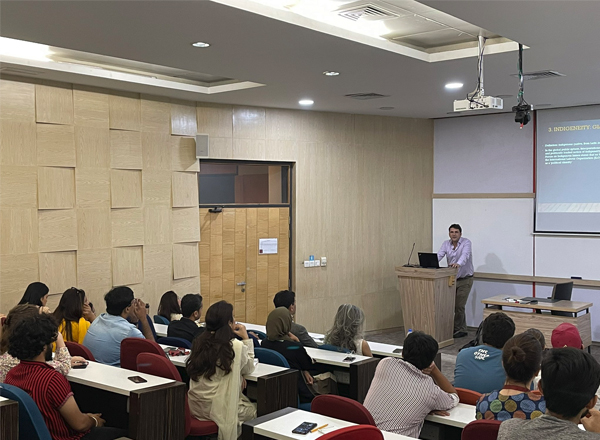
The CBER with the support of Hans Seidel Foundation Pakistan invited Dr. Philipp Zehmisch, Senior Academic Staff, Department of Anthropology South Asia Institute (SAI) at Heidelberg University to give a lecture on "Who or what came first? Multi-species Migrations and the Question of Indigeneity in Pakistan" Dr. Philipp Zehmisch research combines Political Anthropology, Subaltern, Borderland, and Migration Studies to understand the long-lasting legacies of the Partition of British India. He interacted with IBA faculty and students about Multi-species Migrations and the Question of Indigeneity in Pakistan.
The Political Economy of National Curriculum of Pakistan
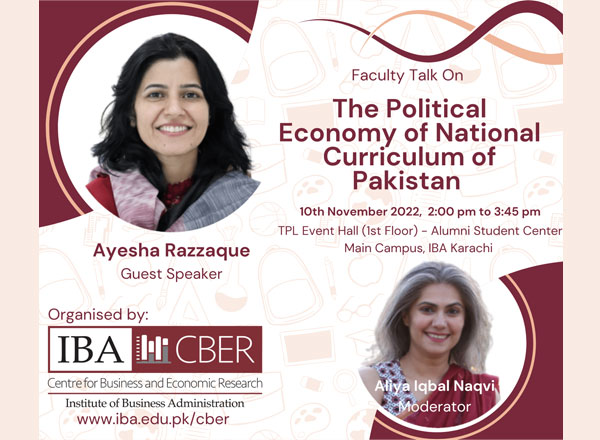
The CBER was glad to invite Dr. Ayesha Razzaque, Deputy Chief of Party, University of Utah, and former Technical Advisor to the Ministry of Federal Education and Professional Training to talk about ‘The Political Economy of National Curriculum of Pakistan’. This interactive talk was attended by faculty and graduate students at the IBA Karachi.
Zotero 101: Getting Started
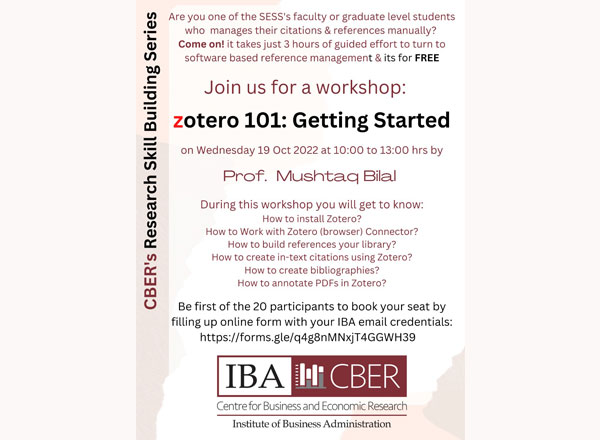
The CBER under the Research Skill Building Series conducted "Zotero 101: Getting Started" with Dr. Mushtaq Bilal, Assistant Professor at SESS IBA. The session was for academics and early researchers who struggle to format their citations and references manually. The workshop focused on building library, creating text citations and creating bibliographies in Zotero.
Publishing your First Journal Article with Dr. Mushtaq Bilal, Assistant Professor at SESS IBA
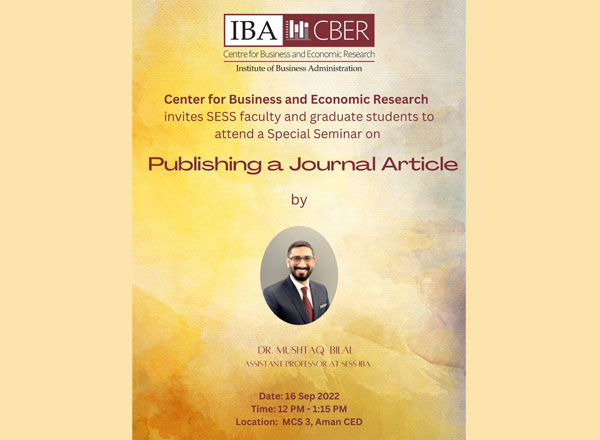
The CBER organized a special session on Publishing your First Journal Article with Dr. Mushtaq Bilal, Assistant Professor. The session was attended by undergrads, Early scholars, and faculty at the IBA.
The (CBER) at (IBA), Karachi organized a special webinar on Floods 2022: Situation, Response, Blind Spots, and Way Forward
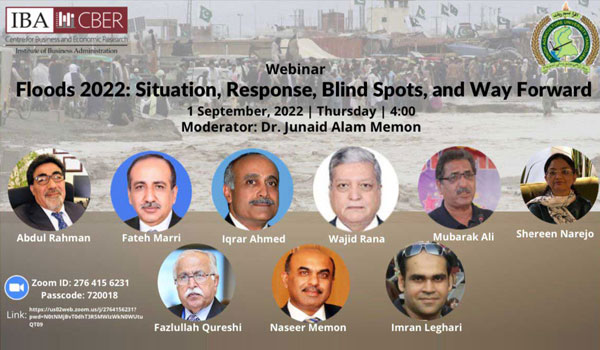
September 01, 2020: The Centre for Business and Economic Research (CBER) at the Institute of Business Administration (IBA), Karachi organized a special webinar on "Title: Floods 2022: Situation, Response, Blind Spots, and Way Forward," in collaboration with Sindh Agriculture University, Tandojam. The webinar aimed to bring the best minds to enhance the understanding of recent floods in Pakistan and the magnitude of losses, assess the state of our disaster management capacity, human and other resources constraints, and agree on short-, medium- and long-term recommendations. The session was moderated by Director CBER IBA Karachi Dr. Junaid Alam Memon, who introduced the speakers to the audience. Attendees included members from the academia, corporate sector, media, the IBA faculty, students, and alumni. For more details see here
The Director CBER, Dr Junaid Alam Memon presented a presentation on "Mid-term Evaluation of Climate Smart Agriculture Project"
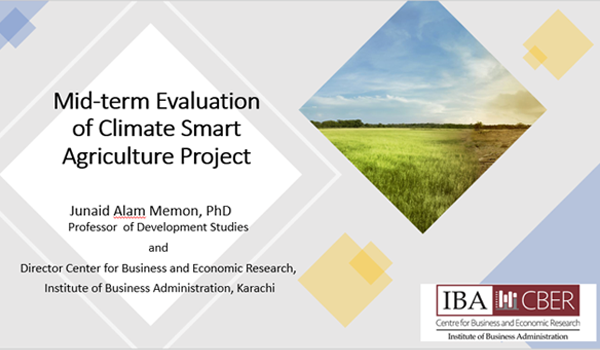
The Director CBER, Dr Junaid Alam Memon presented a presentation on "Mid-term Evaluation of Climate Smart Agriculture Project", a quasi-experimental study carried in the backdrop of TRDP Project called “Strengthening food security resilience of small-holder farmers by adapting climate change through multi-level approaches of District Umerkot of Sindh Province in Pakistan”
This study was intended to monitor the project and its associated activities. This study touched base through detailed literature review including the earlier project reports and data to determine if and how project could bring positive change in Months of Adequate Household Food Provisioning (MAHFP) and Household Dietary Diversity Score (HDDS) of the project beneficiaries.
The Presentation can be accessed here.
The State of Pakistan's Economy: Struggling with Uncertainty | 2022-23
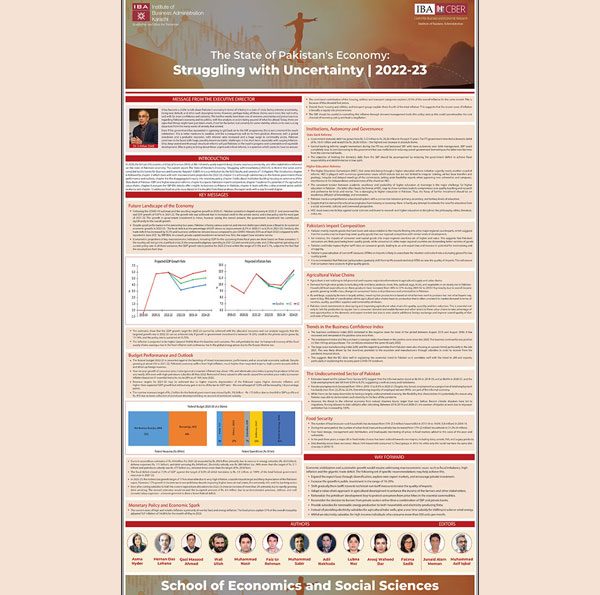
The state of Pakistan’s Economy: Struggling with Uncertainty | 2022-23, is third in the series and is compiled by the Centre for Business and Economic Research (CBER). It is a contribution by the SESS faculty and consists of 12 chapters. The book looks into different sections of the economy including budget performance, macroeconomic outlook, monetary policy, trends in business, food security, import composition, institutions, agriculture value chains and the way forward for Pakistan's economy. The book will be available in August 2022.
Guest Lecture on "Crony Globalization: Evidence from Muslim societies"

The CBER hosted a guest lecture by Faisal Z. Ahmed, Professor of Politics at the Princeton University on 21st Jan 2022. Prof. Faisal presented the findings of his study where they explored how less democratic regimes leverage economic globalization to entrench their rule. The findings of the study showed that the more hesitant and partial approach in many Muslim societies towards economic globalization may comprise a strategy of regime stability. To draw causal inferences, the study used a difference-in-differences research design that leveraged the timing of the World Trade Organization's (WTO) establishment in 1995. Using this plausibly exogenous (global) shock to trade liberalization, the study showed that Muslim societies have systematically lagged in relative terms (to non-Muslim countries) on measures of de jure globalization capturing various economic restrictions expressed through tariffs, hidden import barriers, taxes on international trade, and investment and capital account restrictions. The findings suggest that partial liberalization can be a strategy for regime stability in many Muslim societies.
The lecture was followed by lunch where the faculty and doctoral students had the opportunity to discuss the topic further.
The video of the lecture can be accessed here.
Development: Discourses and Critiques - 2nd Annual International Conference of School of Economics and Social Sciences, IBA Karachi

We are super excited to announce that we have received more than 300 paper submissions from all over the world for our 2nd International Conference. Thankful to all participants from across the globe. map of submissions
CALL FOR PAPERS - 2nd Annual International Conference at School of Economics and School Sciences at IBA Karachi

The School of Economics and Social Sciences (SESS), in collaboration with the Center for Business and Economics Research (CBER) at IBA Karachi opens the general submissions' call for papers for its 2nd international conference titled "Development: Discourses and Critiques" The theme for this year recognizes the diversity within Social Sciences and Humanities and the need to be critical of our sources of knowledge.
Following are the sub-themes of the conference
- Economic growth, reforms, and innovation
- Firms, productivity, and competitiveness
- Labor, inequality, and Poverty
- Agriculture, Food Security and Climate Change
- Political Economy and Governance
- Health and Socioeconomic Welfare
- Human Behaviors and Social Psychology
- Feminist and Decolonial Perspectives on Development
- Literary, Visual, and Digital Worlds
- Language, culture, and development
The Climate Conference by CBER

The Center of Business and Economic Research (CBER) and the Hanns Seidel Foundation (HSF) Pakistan at the IBA Karachi organized a two day conference titled "Climate Change - Threats, Risks and Vulnerabilities" on 8th-9th October 2021. The aim of the conference was to create a conversation around climate change as a non-traditional security challenge as the changing climate and environmental degradation is increasingly and adversely affecting migration, deterioration of environmental conditions and resource constraints. Researchers from all parts of the world have projected an increase in frequency and severity of catastrophic environmental events, causing food and water scarcity, health and socio-economic issues in coming decades, hence making this discourse a highly important conversation.
The program included six panel discussions and four dairas (informal circles) on topics including ecology and the state, infrastructure, speciesism in intersectionality, scorching cities, political ecologies of Sindh's coastal areas' water, displacement, multispecies collaborative survival, entrepreneurship, fair trade, ethical practices and more. Several policy makers, academicians, development practitioners and students participated in this conference physically and virtually.
Discussion on the State of the Economy and the Federal Budget 2021-22

On 18th June 2021, the CBER organized a session to discuss the state of the economy and the federal budget for the fiscal year 2021-22. Renowned economist, former advisor to the Prime Minister on Institutional Reforms and Austerity, and Ex Dean and Director IBA, Dr. Ishrat Hussain was the guest speaker. Dr. S. Akbar Zaidi moderated the session.
The session was based on the report written by faculty and researchers from the Economics department at IBA. The comprehensive report included sections on labor, government policies, agriculture, health, education, major industries, social protection, and youth
Launch of State of the Economy and Budget Report 2021

On 15th September 2021 , the report on the State of the Economy and Federal Budget 2021, authored by faculty and researchers in the Economics department at IBA, was launched in the form of an eBook. Renowned economists including Dr. Mubarik Ahmad, Technical Specialist in Agricultural Policies, Professor Dr. Samina Khalil, Director Applied Economics Research Centre, and Dr. Waqar Masood, Special Assistant to PM on Revenue were invited to the launch.
The guests presented their views on the report. They commended the efforts of the faculty for presenting an accurate picture of Pakistan's economy. The engaging talk that ensued focused on the way forward for Pakistan on its road to economic progression.
Dr. Akbar Zaidi and Dr. Asma Hyder moderated the session.